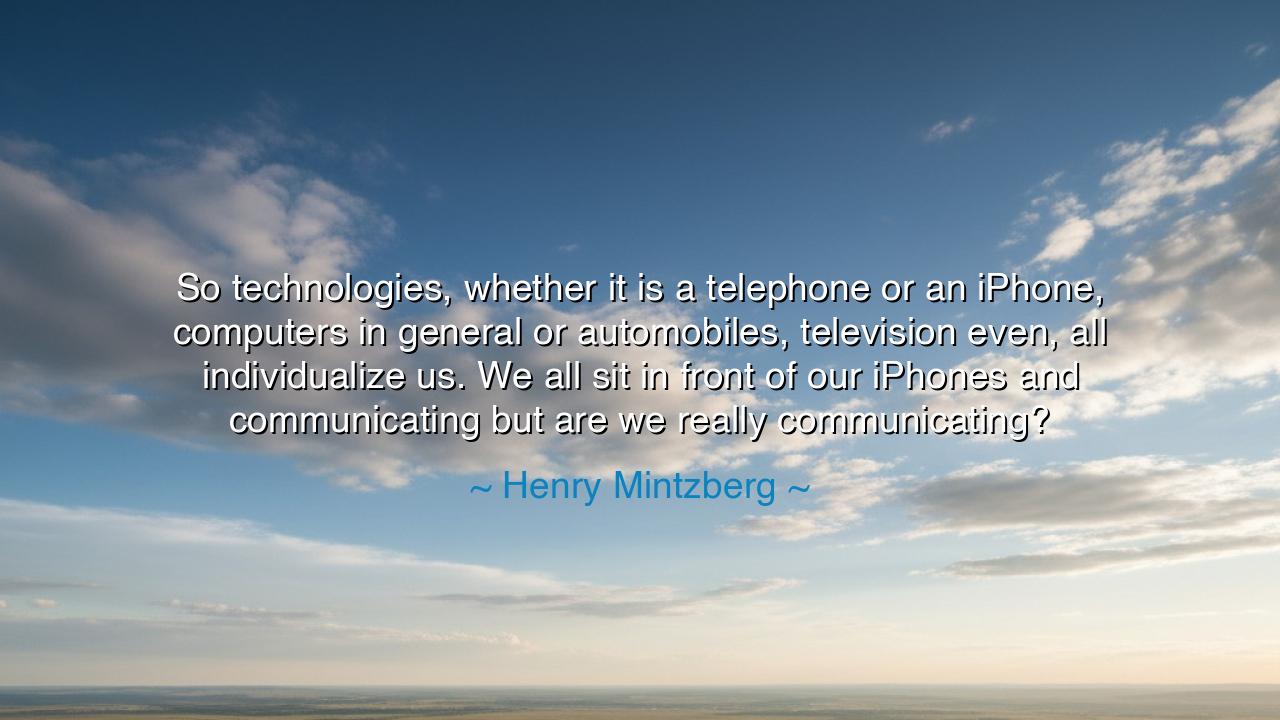
So technologies, whether it is a telephone or an iPhone
So technologies, whether it is a telephone or an iPhone, computers in general or automobiles, television even, all individualize us. We all sit in front of our iPhones and communicating but are we really communicating?






“So technologies, whether it is a telephone or an iPhone, computers in general or automobiles, television even, all individualize us. We all sit in front of our iPhones and communicating but are we really communicating?” Thus spoke Henry Mintzberg, the wise scholar of organization and human behavior, whose insight pierces the glittering illusion of modern life. His words, though spoken softly, carry the thunder of truth — that the very tools built to connect humanity have also served to separate it. In his reflection lies not anger but lament — the sorrow of a thinker who has watched mankind trade the warmth of presence for the cold glow of a screen.
In the ancient days, the philosophers and poets knew that true communication was more than the exchange of words; it was the meeting of souls. When Socrates spoke beneath the Athenian sky, his students gathered around him — not only to hear, but to feel, to witness, to live within the rhythm of his thought. Each glance, each silence, was part of the dialogue. But in the world Mintzberg describes, the ancient circle has been broken. The people now sit apart, each in their own chamber of light, their faces lit by devices that promise connection but deliver isolation. They speak endlessly, yet listen rarely; they are linked everywhere, yet belong nowhere.
Mintzberg’s insight was born not of cynicism but of observation. As a scholar of management and society, he saw how modern institutions — and the technologies that sustain them — reshaped not only work but the human spirit itself. The telephone, once a marvel that bridged distance, became a wall between the voice and the touch. The television, once a window to the world, became a silent companion that replaced conversation. The automobile, a symbol of freedom, spread men farther apart, as the intimacy of the village gave way to the loneliness of the highway. And now, in the age of the iPhone, we have reached the summit of paradox — where everyone speaks, but no one is heard; where we scroll endlessly through the lives of others, yet feel unseen in our own.
Consider the story of the Tower of Babel, that ancient tale of mankind’s quest to ascend the heavens. The people, united by one tongue, built a tower to reach the divine. But as they grew proud, their speech was confounded, and they could no longer understand one another. The tower fell, and humanity was scattered across the earth. In our time, the towers are no longer of stone but of signal and circuitry, yet the result is the same. We have built a new Babel — vast, glittering, and filled with endless communication — but we understand one another less than ever. We send messages faster than thought, yet lose the meaning between the words.
Mintzberg’s question — “Are we really communicating?” — is the cry of a teacher watching his students speak to machines instead of to each other. True communication, he reminds us, is not the movement of data but the exchange of empathy. It requires silence as much as speech, patience as much as expression. It is forged in presence — the look in the eye, the tone of the voice, the breath shared between words. Without these, conversation becomes mimicry; connection becomes simulation. The danger is not that we use technology, but that technology begins to use us — shaping our thoughts, dulling our senses, replacing the symphony of human interaction with the static hum of constant notification.
Yet Mintzberg does not call us to despair. His wisdom is not rejection, but rebalancing. The tools we have made are not evil; they are mirrors reflecting our desires. To use them wisely, we must remember that technology should serve humanity, not consume it. The telephone, the computer, the iPhone — all can be bridges if guided by intention, but prisons if left to habit. The task of the modern soul, then, is not to destroy these tools, but to master them — to reclaim from the machine the art of being present.
So, O seeker of wisdom in this digital age, take heed of Mintzberg’s lesson: speak less through machines, and more through the heart. Sit face to face with your friend; walk with them beneath the open sky. Let the glow of conversation replace the glow of the screen. When you speak, listen. When you write, mean. When you connect, be there fully. For no signal, however strong, can carry the warmth of a living soul.
Thus, let this truth be passed down: the world does not need more communication — it needs more communion. And though the machines may hum and beckon, remember that the truest conversation still begins with a look, a voice, and a human heart that dares to be heard.






AAdministratorAdministrator
Welcome, honored guests. Please leave a comment, we will respond soon